Published: 10 December 2020
Close on 1,400 completers of comprehensive school aged under 18 outside education
According to Statistics Finland's education statistics, 2.4 per cent of completers of comprehensive school aged under 18, or close on 1,400 pupils, did not continue in education in 2019. Altogether 54 per cent continued in upper secondary general education, 40 per cent in vocational education, one per cent in additional education of basic education (10-grade) and two per cent in guidance or preparatory education. Seventy per cent of new passers of the matriculation examination in spring did not continue studies leading to a qualification or degree in the year of the matriculation examination. The share of new passers of the matriculation examination left outside further studies has grown over 12 years.
Direct continuation to further studies for completers of comprehensive school 2019 (aged under 18), %
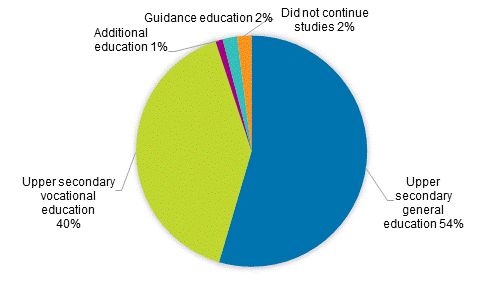
In 2019, the number of completers of the 9th grade of comprehensive school was 59,000, of whom 57,500 were aged under 18. Nearly all completers of the 9th grade of comprehensive school applied immediately to further studies, one per cent did not do so. In all, 65 per cent of girls and 43 per cent of boys applied primarily to upper secondary general school. In all, 33 per cent of girls and 55 per cent of boys applied primarily to upper secondary vocational education.
Direct continuation to further studies for completers of comprehensive school 2009–2019
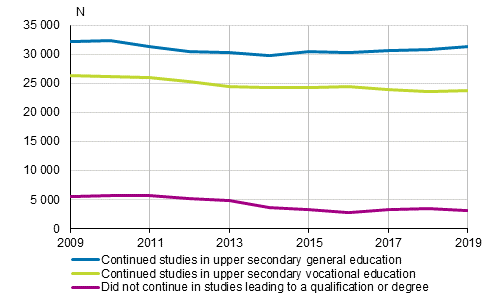
Ninety-three per cent (94 per cent of those aged under 18) of completers of comprehensive school continued in education leading to a qualification. Of those who had completed their studies, 53 per cent (54 per cent of those aged under 18) continued in upper secondary general school and 40 per cent in vocational education (also 40 per cent of those aged under 18). The share of those continuing in vocational education decreased from the previous year. A total of 1,300 completers of comprehensive school continued in guidance and preparatory education and almost 800 in additional education of the comprehensive school (10th grade). In all, 1,900 completers of comprehensive school remained outside all of the above-mentioned education, of whom 1,400 were aged under 18.
Seventy per cent of new passers of the matriculation examination remained outside education
In 2019, the number of new passers of the matriculation examination without a place for further studies grew by 0.5 percentage points from the previous year, even though the share of those having received a place for further studies in tertiary level education increased slightly. Ten per cent of new passers of the matriculation examination continued in university of applied sciences education and 18 per cent in university education. The share of those continuing in vocational education decreased further. Universities must reserve some of the student places in the joint application for those applying for their first place in tertiary education, nevertheless, the share of those left without a place for further studies has grown for the past 12 years. Nearly one-half, or 48 per cent, of the passers of the matriculation examination in spring 2007 continued their studies in the same year, while in 2019 only 30 per cent of the passers of the matriculation examination in spring continued.
Direct transition to further studies of passers of the matriculation examination in the spring semester 2007–2019, %
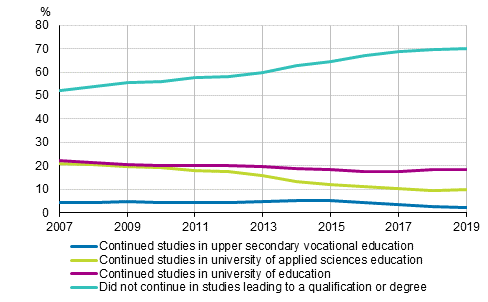
Although the share of men having received a place for further studies immediately in the same year grew by 0.4 percentage points, the share of women weakened by 1.2 percentage points. In all, 65 per cent of men and 74 per cent of women did not have a place for further studies. Male passers of the matriculation examination continued more often than women in university and university of applied sciences education, 35 per cent of men and 24 per cent of women started tertiary level studies.
Passers of the matriculation examination, who did not continue studies leading to a qualification or degree by gender 2003–2019, %
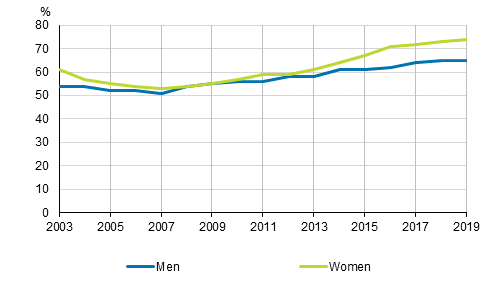
In the year of passing the matriculation examination, 81 per cent of passers of the matriculation examination, 79 per cent of men and 82 per cent of women, applied for a place for further studies. The number of applicants to further studies fell by 1.7 percentage points. Application to university education increased but application to university of applied sciences education decreased. Fifty per cent of passers of the matriculation examination applied only to university education and 16 per cent applied only to university of applied sciences education. Fourteen per cent of new passers of the matriculation examination applied simultaneously to both university of applied sciences and university education and one per cent to upper secondary vocational education.
Many new passers of the matriculation examination have to have a gap year or years before finding a place for further studies, even though most apply to further studies right after passing the matriculation examination.
Entrance to education by passers of matriculation examination in 2016, %
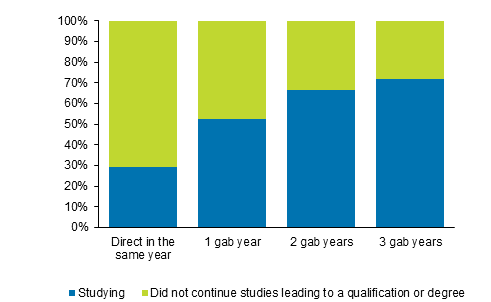
When examining the placement of new passers of the matriculation examination (30,980) in 2016 to further studies by the end of 2017, a place for further studies had been found after one gap year by 53 per cent, 45 per cent had started studies in tertiary education and seven per cent in upper secondary vocational education. After two gap years most had started further studies. Sixty-six per cent were studying, 60 per cent in tertiary education and six per cent in upper secondary vocational education in 2018. The share of those starting studies after three gap years had grown to 72 per cent. Entrance to further studies was weaker after gap years for passers of the matriculation examination in 2016 than for passers of the matriculation examination in the previous year, see the previous year 's statistics.
More detailed information on application and transition to further studies of completers of comprehensive school and passers of the matriculation examination, and basic education of applicants to education and new students can be found in the database tables .
Source: Education. Statistics Finland
Inquiries: Anna Loukkola 029 551 3678, koulutustilastot@stat.fi
Head of Department in charge: Hannele Orjala
Publication in pdf-format (295.9 kB)
- Tables
-
Tables in databases
Pick the data you need into tables, view the data as graphs, or download the data for your use.
Appendix tables
- Appendix table 1. Direct transition to further studies of completers of the 9th grade of comprehensive school 2000 - 2019 (10.12.2020)
- Appendix table 2. Immediate transition for further studies by new passers of the matriculation examination 2005 - 2019 1) (10.12.2020)
- Appendix table 3. Entrance to education by passers of the matriculation examination in 2016 1) (10.12.2020)
Updated 10.12.2020
Official Statistics of Finland (OSF):
Entrance to education [e-publication].
ISSN=1799-4527. 2019. Helsinki: Statistics Finland [referred: 2.3.2026].
Access method: http://stat.fi/til/khak/2019/khak_2019_2020-12-10_tie_001_en.html

